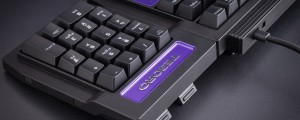 The last five years have brought several major changes to the face of computing technology. While rapid advances in silicon have brought us ever-faster CPUs and GPUs, the opinion of many enthusiasts (myself included) is that the most dramatic shift in the way we build our PCs is the move from the nearly 60-year old mechanical hard disk technology to pure silicon Solid State storage.
The last five years have brought several major changes to the face of computing technology. While rapid advances in silicon have brought us ever-faster CPUs and GPUs, the opinion of many enthusiasts (myself included) is that the most dramatic shift in the way we build our PCs is the move from the nearly 60-year old mechanical hard disk technology to pure silicon Solid State storage.
It’s hard to get a “dramatic” upgrade in performance nowadays. The last time I remember dropping in an upgrade and being floored at the night-and-day difference was the first time I put a 3D accelerator in my PC back in the Voodoo II days. A single upgrade was a transformative experience—it was like getting a whole new machine. Those days dwindled for quite a while, as performance increases were so negligible—even when we got dual- and quad-core CPUs, it wasn’t that big a difference from upgrade cycle to upgrade cycle.
Then we got SSDs. The difference in the overall computing experience between mechanical and solid state storage is intense. Dropping an SSD into your PC makes every single aspect of your day-to-day move faster. Sometimes twice as fast. Sometimes three times as fast. It’s more than noticeable. It’s one of those “I cannot possibly go back to the old way” differences.
So if SSDs are so freaking amazing, why isn’t everybody using them?
They’re not cheap
We will never have enough storage space. I’m typing this on a computer with nearly four terabytes of storage space and I’m still thinking I could use more—and I don’t even have a movie collection or anything. No, for me it’s a massive gaming library (between Steam and Origin alone I’m over half a terabyte), all of my photography (I keep all my images in Camera RAW format, which means every single picture is 6-8mb), and my entire music library (30gb and growing), not to mention my video editing projects including a backlog of all my old family videos.
While it’s technically possible to have 4tb of SSD storage, the cost factor makes it utterly absurd: It would cost nearly $10,000 to have 4tb of SSD space at today’s prices.
So the way most people do it is to have a small, fast SSD for their operating system, and then large, old-fashioned, mechanical platters for their mass storage needs. The benefits of the SSD are mostly felt in the boot-up times and operating system functions anyways, so this is not a bad system.
This means that in order to have the benefits of SSD (fast bootups, quick small file access, a zippy day-to-day OS experience) and HDD (massive storage, cheap drives), you need two separate devices in each PC.
But what if there’s a better way?
Enter the hybrids
The SSD paradigm shift has hit the storage industry hard. Traditional hard disk manufacturers such as Hitachi, Western Digital, and Seagate have been thrown for a loop as a glut of new competitors have entered their cloistered market. All of the sudden these monoliths—many whom invented some of the interface and access standards that still manifest today—have had to contend with upstarts like OCZ and Corsair—companies that have been in the flash or RAM markets previously and suddenly found themselves sitting on everything they needed to make SSDs. OCZ went so far as to stop making RAM (the market they started in), buy a storage controller company, and re-brand themselves as a purveyor of high-end SSD technology, taking market share from hard drive companies. What do old standbys like Seagate do? They were mechanical manufacturers: they had factories and technologies to make very shiny metal disks with very tiny metal particles on them spin very quickly. They also had a lot of magnets. This new SSD stuff was alien technology.
Well, of course that doesn’t mean that they needed to throw in the towel. If you can’t beat ’em, join ’em. The mark of a good company is being able to adapt to the times.
Let’s face the facts: The writing is on the wall for mechanical hard drives. At 60 years old, it’s sunset time for the tech. It had a really, really good run. Innovations are still being made today in terms of capacity, speed, and cost, but the simple matter is that mechanical drives are extremely complicated, have moving parts, and ultimately will never be as fast as a pure electronic device.
So Seagate did what any savvy company should do when the world turns: turn with it. They started manufacturing their own SSDs but have yet to gain brand recognition in this new market.
However, Seagate has one thing these upstart SSD companies don’t: Decades of experience as hard drive manufacturers and the capacity to make mechanical disks cheaply. So why not stick the two together and make a drive that contains the best of both worlds? A mechanical disk that contains massive storage and an SSD that allows extremely fast access to common files?
That’s what they did. Seagate (and arguably Samsung) invented the hybrid drive in 2007, and now in 2011 the technology has matured and is widely available. Seagate sent us a Momentus XT 750gb hybrid drive to test out and report our findings. Let’s dive in.
The best of both worlds
The current-generation Seagate Momentus XT is available in a 750gb capacity. It is a 2.5″ drive suitable for laptops or desktops. There is an older Momentus XT availble in 500gb capacity, but it is last-generation with an older SATA 3gb/s interface.
The fact that this is a hybrid drive raises a lot of questions, especially amongst the technology-minded. In fact, this is one of those situations where techies want to over-complicate it because this device breaks the paradigm, so we want to understand it. For a moment, pretend that this is just a standard 750gb mechanical hard drive. It is presented to your computer as a standard drive with decent specs: 7200rpm, 750gb capacity, SATA 6gb interface, 32mb cache.
The hybrid part comes from the inclusion of 8gb of SLC NAND. This is not accessible in any front-facing manner: it is invisible to the user. You can’t choose to put data on the SSD section. Rather, Seagate has a technology they call “FAST”, or Flash-Assisted Storage Technology. This manifests as a controller that decides what data should be copied onto the NAND for faster access. It will copy frequently-accessed data to the NAND cells and send those through the controller when that data is requested by the operating system. It’s important to note that the data that is on the NAND is a copy of data that already exists on the platters, therefore you’re not going to lose it to bad cells or whatever. It might help to think of this drive as 750gb+8gb if that clears things up. Put another way: YOU can’t write to the SSD, only the controller can.
In practice, this means that most of your OS is copied to the NAND. This results in insanely improved boot times over standard HDs as well as faster load times for applications—which, conveniently, are the areas that mechanical HDDs struggle with most often. This makes the computer “feel” much, much faster. Actually, feel is the wrong word. It IS faster.
Performance
Time for some benchmarks. Now, because of the unique nature of the drive, the FAST controller will most likely not help benchmark numbers at all since the data is created one-off for benchmarking. What we’re testing here is basically the performance of the mechanical drive. These numbers will not tell the story of the aspects of the experience that do benefit from FAST.
First, let’s look at the side-by-side. The testbench is an average PC: AMD Phenom II X4 965 on an AMD 890 chipset, 4gb of DDR3 RAM, Windows 7 64bit.
I tested the Momentus XT against a Crucial 64gb C300 RealSSD and a Western Digital 10krpm 74gb Raptor drive. I wanted to see where it stood.
As you can see the Momentus falls in line exactly where it should: Firmly between the old and the new. The Raptor is showing its age here as it tops out around 64mb/s. The SSD, of course, blows them both away with 350-400mb/s reads and nearly 80mb/s writes. The Momentus is at a nice, comfortable middle ground: 114mb/s read and write. This is what you can expect for everday data transfers, such as copying files back and forth.
AIDA64 tells a similar story:
As you can see, the buffered reads on the Momentus XT are light-years beyond the Raptor. Nearly five times faster. This drive is almost twice as fast as a 10krpm WD Raptor, just in synthetic benchmarks.
Now for the real test: Bootup times. First of all, I’ll link a video made by Seagate that tells the story from their perspective:
This video shows boot-up comparisons between a stock 7200rpm HD, the Momentus XT, and an Intel SSD. As you can see, the Momentus boots nearly as fast as an SSD, and way faster than the standard HD.
I ran my own independent boot test. I used my HP EliteBook 8740W workstation that comes stock with a 500gb 7200RPM Seagate Momentus (not to be confused with the XT; this is an older Momentus, which is a standard mechanical HD). Boot time with the standard HD was 01:20 to full readiness. With the Momentus XT in there, the boot time was significantly faster: 25.2 seconds to full readiness, which is just a touch over three times faster. I’d call that a significant improvement.
Use cases
So what is this drive for? Is it the last, ultimate HDD? Does this represent the final culmination of 60 years of technological development in terms of consumer storage? In many ways, it does. This is probably the last major innovation we’ll see in mechanical storage. This may be the last mechanical hard drive some of us ever buy.
It’s a strange beast. At $239.99, it’s not cheap, but it’s certainly far less expensive than an SSD with equivalent storage space. It’s quite a bit more than an equivalent 2.5″ 7200rpm HDD (like this Western Digital Scorio Black 750gb), but really, does a drive like this deserve to be compared to those? It’s not either—it’s a hybrid in the truest sense of the word.
If you’re a mobile PC gamer, there is no other drive for you. With the size of installed games, most laptop owners don’t really have a lot of choices. You can install an SSD for top speeds, but you’ll be installing and uninstalling games in your library just to make room. Hell, World of Warcraft nowadays would kill a normal SSD. A 750gb drive will hold your entire game library, no matter how absurd it is (unless you’re Winfrey).
It is just about as fast as a Western Digital 600gb Velociraptor (which is commonly accepted as the fastest consumer HDD out there), and it’s nearly $100 less and 150gb bigger. Besides, it matches the Velociraptor’s performance (a 10krpm drive) while spinning at 7200rpm. This means it will use a less power and generate less heat (very important considerations for laptop owners). On top of that, the Velociraptor needs a big heatsink to run; even though it’s a 2.5″ drive, it’s a desktop part because of the 3.5″ heatsink.
Recommendation
 If you have the extra money to spend, this drive is definitely one of the fastest mechanical disks that we’ve ever tested. It would be a significant upgrade to a laptop that has a 7200rpm HDD in it, and a mind-blowing upgrade for a laptop that is saddled with a 5400rpm HDD.
If you have the extra money to spend, this drive is definitely one of the fastest mechanical disks that we’ve ever tested. It would be a significant upgrade to a laptop that has a 7200rpm HDD in it, and a mind-blowing upgrade for a laptop that is saddled with a 5400rpm HDD.
Seagate made a very, very savvy move in creating this drive. They remain highly relevant, they deliver a best-in-class device for a significant market, and they are able to utilize and leverage their assets to create a high-end product for demanding consumers in a rapidly changing business. Remember, everything these guys know is changing, and maybe even ten years from now, will be considered archaic.
I’m fascinated with this drive. It represents the pinnacle of hard drive technology, and is the best in class for what it does. It’s basically the perfect hard drive for a very large niche, and I know for sure that I’ll be recommending it to anybody building a system or upgrading a laptop. Because of this, I’m very happy to award the Seagate Momentus XT 750gb hybrid drive our rare Icrontic Golden Fedora, our highest honor for product excellence.
The Seagate Momentus XT hybrid drive is available from Newegg and Amazon for $239.99.

























 Articles RSS
Articles RSS